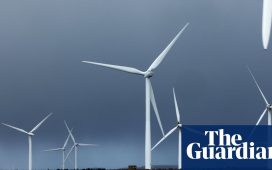The boss of the British Gas owner, Centrica, has seen his earnings nearly double to £8.2m, despite having admitted that his smaller pay packet the previous year was “impossible to justify”.
Chris O’Shea earned a basic salary of £903,000, which was topped up by cash and share bonuses worth an extra £7.3m.
The chief executive’s total remuneration ballooned largely thanks to a £5.9m bonus scheme that rewarded him for hitting targets linked to the company’s share price, profits, cashflow and measures such as safety and customer satisfaction.
Centrica’s share price has risen steadily in the past two years, partly coinciding with the surge in global gas prices after Russia’s invasion of Ukraine.
But the company insisted that O’Shea’s performance was behind the rise.
The details of O’Shea’s pay deal emerged in Centrica’s annual report, which was published on Tuesday, a month after the company reported bumper profits.
Profits at British Gas, which supplies energy to UK households and businesses, jumped to £751m in 2023, up from £72m a year earlier.
The big increase came after the regulator, Ofgem, raised the industry price cap and allowed the company to recoup some of the costs of having to sell energy below wholesale prices to its 10 million customers during the energy crisis.
O’Shea said earlier this year that there was “no point” in trying to argue in support of his pay deal, which came in at £4.5m. “You can’t justify a salary of that size,” O’Shea told the BBC. “It’s a huge amount of money; I am incredibly fortunate. I don’t set my own pay; that’s set by our remuneration committee.”
But on Tuesday, Centrica tried to justify a package nearly twice the size, laying out the rationale for this year’s £8.2m deal in a dedicated section in its annual report.
The company’s pay committee, chaired by the boardroom veteran Carol Arrowsmith, said it had concluded that a £5.9m share bonus linked to the company’s performance between 2021 and 2023 had not been unduly boosted by any “windfall” gains.
Two-thirds of the bonus was linked to the company’s share price, which has more than doubled during the period, which includes the invasion of Ukraine and its aftermath, including surging gas prices.
The committee reviewed O’Shea’s overall £8.2m pay-plus-bonus package, saying the 82% year-on-year rise was “due to continued improvements in underlying performance and substantial share price growth”.
after newsletter promotion
The pay committee said that the sum “appropriately reflects the performance of Chris O’Shea and the business over the relevant period. It is worth noting that the single figure of total remuneration for the group chief executive over the next two years is likely to be lower”, the company said, citing reductions in scale of share-based bonuses it offered executives.
In practice, O’Shea’s total pay could end up being worth less or more, depending on the changing value of his bonus shares, which he will be allowed to sell over the next three years.
Luke Hildyard, executive director for the High Pay Centre, said: “As Mr O’Shea himself admitted a few weeks ago, it’s not really credible to argue the work that he does is at all proportionate to a pay award even half this size, nor is it necessary to the success of the company. It’s a major governance failure and by extension a policy failure.”
Arrowsmith said: “We need to ensure Centrica is set up for success in the long term and that means attracting and retaining high-performing executives who can lead this large and complex business. Our CEO’s pay is based on the terms he was appointed on. The structure of the package was approved by our shareholders, and it is consistent with similar companies.”
In the same section of the annual report detailing O’Shea’s remuneration, Centrica said it had spent £140m on supporting customers struggling to pay their energy bills.








